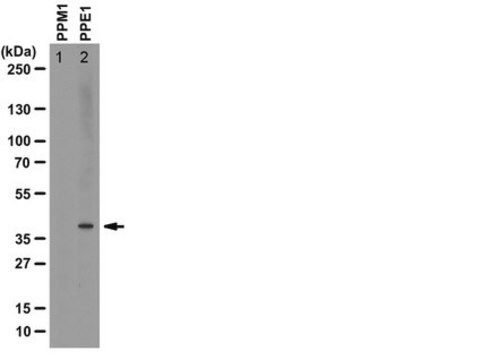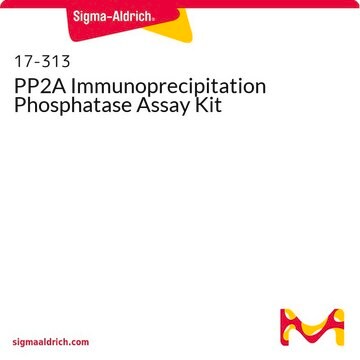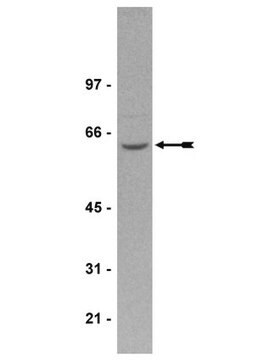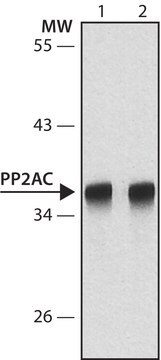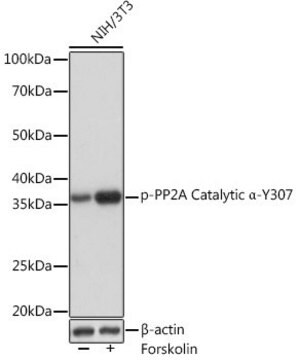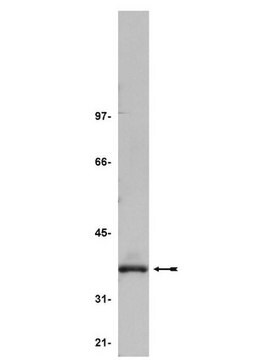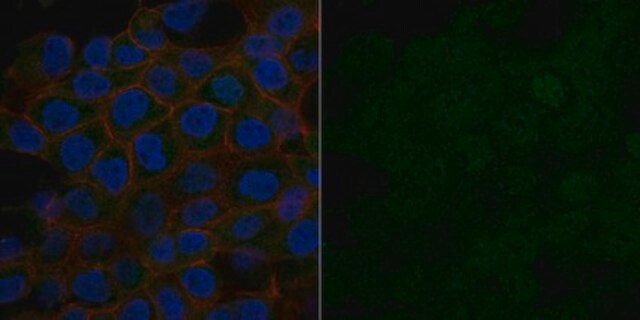05-421
Anti-PP2A Antibody, C subunit, clone 1D6
clone 1D6, Upstate®, from mouse
Synonym(s):
Replication protein C, protein phosphatase 2 (formerly 2A), catalytic subunit, alpha isoform, protein phosphatase 2, catalytic subunit, alpha isoform, serine/threonine protein phosphatase 2A, catalytic subunit, alpha isoform
About This Item
Recommended Products
biological source
mouse
Quality Level
antibody form
purified immunoglobulin
antibody product type
primary antibodies
clone
1D6, monoclonal
species reactivity
Saccharomyces cerevisiae, bovine, rabbit, rat, Xenopus, mouse, human
manufacturer/tradename
Upstate®
technique(s)
immunocytochemistry: suitable
immunoprecipitation (IP): suitable
western blot: suitable
isotype
IgG2bκ
NCBI accession no.
UniProt accession no.
shipped in
dry ice
target post-translational modification
unmodified
Gene Information
human ... PPP2CA(5515)
General description
Specificity
Immunogen
Application
4 µg of a previous lot immunoprecipitated PP2A from 500 µg of A431 RIPA lysate. Note: This antibody has been reported not to block phosphatase activity.
Immunocytochemistry:
5-10 µg/mL of a previous lot of this antibody showed positive immunostaining for PP2A in A431 cells fixed for 10 minutes with 4% paraformaldehyde in PBS.
Signaling
Neuroscience
Neurotransmitters & Receptors
Neurodegenerative Diseases
Quality
Western Blot Analysis:
0.5-2 µg/mL of this lot detected PP2A in human A431 and previously in murine 3T3 RIPA cell lysates.
Target description
Physical form
Storage and Stability
Analysis Note
Positive Antigen Control: Catalog #12-301, non-stimulated A431 cell lysate. Add 2.5µL of 2-mercaptoethanol/100µL of lysate and boil for 5 minutes to reduce the preparation. Load 20µg of reduced lysate per lane for minigels.
Other Notes
Legal Information
Disclaimer
Not finding the right product?
Try our Product Selector Tool.
recommended
Storage Class Code
12 - Non Combustible Liquids
WGK
WGK 1
Flash Point(F)
Not applicable
Flash Point(C)
Not applicable
Regulatory Listings
Regulatory Listings are mainly provided for chemical products. Only limited information can be provided here for non-chemical products. No entry means none of the components are listed. It is the user’s obligation to ensure the safe and legal use of the product.
JAN Code
05-421:
Certificates of Analysis (COA)
Search for Certificates of Analysis (COA) by entering the products Lot/Batch Number. Lot and Batch Numbers can be found on a product’s label following the words ‘Lot’ or ‘Batch’.
Already Own This Product?
Find documentation for the products that you have recently purchased in the Document Library.
Our team of scientists has experience in all areas of research including Life Science, Material Science, Chemical Synthesis, Chromatography, Analytical and many others.
Contact Technical Service